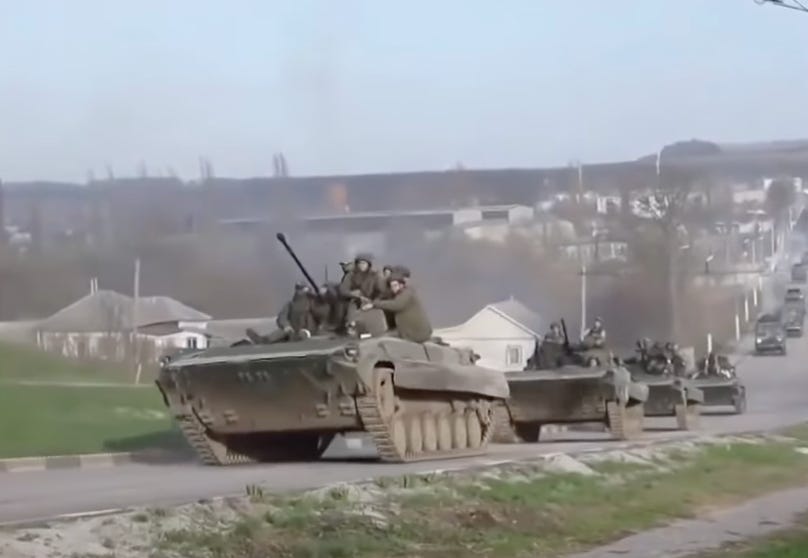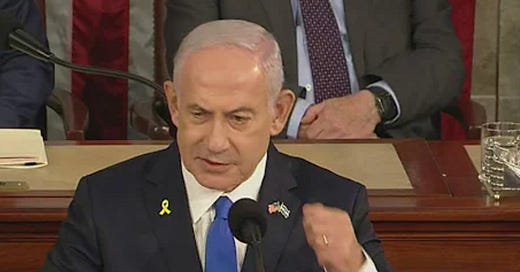
US Foreign Policy is to Blame for the Current Crisis in Ukraine
Don't expect the Deep State to reverse course.
With Russia initiating military operations in Ukraine on February 24, 2022, the entire world is still in a state of shock as events unfold.
Such pivotal movements of world history are going to be filled with a multitude of propaganda campaigns to suit the narratives of both warring parties. While it’s fashionable to criticize Russia for its invasion, of which it should be condemned for, it’s naive to think the West should be completely absolved of its guilt on this occasion.
Succinctly put, the North Atlantic Treaty Organization (NATO) and its expansion since the dissolution of the Soviet Union played a significant role in leading to the present conflict. Looking at NATO and its gradual encroachments in the direction of Russia’s “near abroad” is key to fully understanding the present Russo-Ukrainian conflict.
NATO was originally created in 1949 to balance against the Soviet Union in Europe throughout the Cold War. The military alliance originally had 12 member nations: Belgium, Canada, Denmark, France, Iceland, Italy, Luxembourg, the Netherlands, Norway, Portugal, the United Kingdom and the United States. As the Cold War went on, countries such as Greece and Turkey (1952), Germany (1955), and Spain (1982).
After its bungled invasion of Afghanistan (1979-1989), the Soviet Union realized that it reached its imperial limits. Coupled with a command and control system that shackled its economy and growing nationalism within its constituent republics, the Soviet Union was on the ropes.
The reform-minded leader Mikhail Gorbachev grasped that the Soviet system was not long for this world. From there, he began planning for a post-Soviet security order. On February 9, 1990, Gorbachev met with then-United States Secretary of State James Baker. In that meeting, Baker promised Gorbachev that NATO would not expand “one inch eastward.”
The following year the Soviet Union dissolved, ending the Cold War. However, when the Soviet Union collapsed in 1991, previous promises about NATO expansion slowly evaporated. The administration of Bill Clinton began taking several steps that unsettled Moscow.
During a December 5, 1994 meeting at Budapest of the Conference on Security and Cooperation in Europe (CSCE), tensions between Russia and the US came to a head. At this conference, Clinton revealed that NATO enlargement would proceed, albeit slowly.
Then-Russian President Boris Yeltsin, who was perceived to be a friend of the West, was shocked by Clinton’s proclamation. In light of Clinton’s announcement, Yeltsin declared that a “cold peace” had emerged. Yeltsin described US foreign policy as “domineering” and believed that it was “trying to split [the] continent again” through NATO enlargement.
The American diplomatic establishment, despite its hawkish tendencies, still had significant dissent within its ranks on expanding NATO’s reach. George Kennan, the author of the US’s Cold War containment policy against the Soviet Union, was one of the strongest opponents of efforts to widen NATO’s security umbrella following the end of the Cold War. When Thomas Friedman of the New York Times reached out to Kennan about Washington's desire to grow NATO, the famed US diplomat had choice words about NATO expansion.
Kennan declared, ''I think it is the beginning of a new cold war.” He added:
“I think the Russians will gradually react quite adversely and it will affect their policies. I think it is a tragic mistake. There was no reason for this whatsoever. No one was threatening anybody else. This expansion would make the Founding Fathers of this country turn over in their graves. We have signed up to protect a whole series of countries, even though we have neither the resources nor the intention to do so in any serious way.”
Kennan’s warnings would fall on deaf ears in Washington. NATO started its post-Cold War flexing by bombing Serbia in 1999 on the grounds that the government of Slobodan Milosevic was allegedly committing human rights and acts of genocide against the Kosovar Albanians. That same year NATO also brought the Czech Republic, Hungary, and Poland into its ranks.
NATO expansion continued apace, with Bulgaria, Estonia, Latvia, Lithuania, Romania, Slovakia and Slovenia joining in 2004. International relations theorist John Mearsheimer argued that Russia “swallowed” these NATO accessions at the time. In large part, Russia did so because it had little state capacity to push back against the West.
Throughout 1990s, Russia was a borderline failed state that had to cope with a multitude of internal problems — growing poverty, widespread criminal activity, a radical Islamist insurgency in Chechnya, and the rise of a predatory oligarchical class. At that point in its history, Russia was in no position to defend itself geopolitically against external actors — be they the European Union or the US.
However, Russia made its security concerns clear in 2007 at the Munich Security Conference. Russian President Vladimir Putin excoriated the NATO enlargement project that was drawing closer to Russia’s traditional zone of interest. Putin criticized the US’s "almost uncontained hyper use of force in international relations" and US plans to set up a missile shield in Eastern Europe.
While Western foreign policy analysts were taken aback by Putin’s statements, they still believed that Russia was not serious. At NATO’s Bucharest summit from April 2 to April 4, 2008, NATO did not extend a full invitation to Georgia and Ukraine. Though NATO still left the door open for the two countries to join NATO at an undisclosed period.
Naturally, Putin was incensed by the statement that took place at the Bucharest summit and perceived it as a threat to Russian security interests. The Russian leader desired an explicit commitment from NATO, where it would promise to not add Georgia and Ukraine into its alliance structure.
A few months later, the Russian government demonstrated to the world that it was ready to reassert itself in its backyard by intervening in Georgia. The Russo-Georgian War saw Russia decisively push back Georgian forces that tried to pacify the breakaway territories of South Ossetia and Abkhazia. As a result of this successful Russian military intervention, both territories gained nominal status as independent republics. Only Russia, Venezuela, Nicaragua, Nauru, and Syria have recognized them as independent states.
Despite taking decisive action in Georgia, DC still didn’t get the message. Ukraine would soon become the next theater of a proxy conflict between Russia and the West. After Viktor Yanukovych was elected in 2010, his government took on a multi-vector approach to foreign affairs where he courted both the West and Russia. That changed markedly in 2013 when Yanukovych started drifting towards Russia after the Russian government offered a $15 billion loan package and lower gas prices at the end of the year. Yanukovych’s government previously rejected an EU association agreement that angered many pro-Western Ukrainians who took to the streets in Kiev, leading to the “Euromaidan” crisis.
At the start of 2014, the crisis spiraled out of control and Ukrainian security forces began cracking down on protestors. By February 2014, Ukraine appeared to be in a state of civil war. On February 22, 2014 Yanukovych resigned and sought refuge in Russia when it became clear his government could no longer maintain public order.
In many respects, the events transpiring in Ukraine caught the Russians off guard. As a result, the Russians occupied Crimea and subsequently provided military aid to separatist fighters in Eastern Ukraine. While Russia occupied Crimea, most countries around the world did not recognize this move. Nor did most countries recognize the separatist Luhansk and Donetsk People’s Republics that broke away from the rest of the country out of fear that succeeding Ukrainian governments would crack down on Russian speakers in the region.
The Ukrainian government was in no mood to let these breakaway regions become independent and has attempted to reincorporate them. From February 2014 up until the current year, the Ukrainian military has been shelling the two disputed republics. After failing to bring about a diplomatic solution to the Eastern Ukrainian crisis, Russia rocked the world when it finally invaded Ukraine on February 24, 2022.
Since then, the West has imposed heavy sanctions on Russia and has accelerated its attempts to economically isolate it. However, developing countries such as Brazil, China, India, and Mexico have taken more measured responses towards Russia and promised to maintain their present economic ties with it.
While Russia is not fully isolated, the threat of a world war looms large. And this isn’t any run-of-the-mill conflict. The US could find itself in a nuclear exchange with a country like Russia, which is estimated to have north of 6,000 nuclear weapons, in the case that no de-escalatory measures are taken. A very frightening scenario, indeed.
If the past three decades of foreign policy decision-making have emphatically taught us anything, it’s that restraint is not in Western diplomatic corps’ lexicon. To reach a point of global harmony, the West will need to start acknowledging that its foreign policy escapades generate massive instability on the world stage.
Moreover, Western leaders must come to grips about how their entangling military alliances do more harm than good and create security dilemmas that eventually end in tragedy. Reaching a point of international stability requires introspection and humility on the part of Western diplomats.
We’re no longer in a unipolar moment, and the quicker Western leaders pick up on that, the easier it will be to build a new security architecture based on peaceful coexistence with emerging powers such as China and Russia.
Buy My Book "The 10 Myths of Gun Control" Today
If you’re serious about changing the gun control status quo we live in, this book is a must.
After reading this text, you will be able to hold your own in any debate with your anti-gun friends, family, or associates. No questions asked.
And heck, you will have a solid foundation in championing issues like gun rights should you take your activism to the next level.
Knowledge is power and the foundation for any worthwhile endeavor. With this next-level information at your fingertips, the sky is the limit.
So make today the day you say NO to the gun control status quo by taking action NOW.
The full retail price for The 10 Myths of Gun Control is $6.
Bookmark my Website For Direct Contact
In the era of Big Tech censorship, we can't rely on just one or two platforms to keep us connected. Bookmark my website today so you always know where to get the true, unfiltered information about the news and views that matter to you.
Subscribe to my Premium Newsletter Today
If you’re serious about changing the authoritarian status quo we live in, make sure to join the Niño File on Patreon for as little as $5 a month. This is the premier source for dedicated and passionate leaders who want to not just “move the needle”, but actually win and change the landscape ahead of us.
The Niño File is bringing you the necessary and concise ways to help you identify and train strong candidates, kill bad legislation while actively passing good bills, keeping incumbents accountable and knowing how to replace them when push comes to shove. Those are just the tip of the iceberg, the only way to get so much more is to join today!











I've read this with interest, and get your point. Thanks.